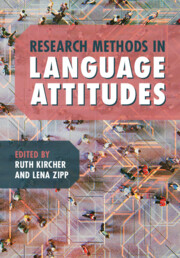Book contents
- Research Methods in Language Attitudes
- Research Methods in Language Attitudes
- Copyright page
- Contents
- Figures
- Tables
- Contributors
- Foreword
- Acknowledgements
- 1 An Introduction to Language Attitudes Research
- Part 1 Analysis of the Societal Treatment of Language
- Part 2 Direct Methods of Attitude Elicitation
- Part 3 Indirect Methods of Attitude Elicitation
- Part 4 Overarching Issues in Language Attitudes Research
- 17 Researching Language Attitudes in Multilingual Communities
- 18 Researching Language Attitudes in Signing Communities
- 19 Researching Language Attitudes Based on Historical Data
- 20 The Use of Priming in Language Attitudes Research
- 21 Mixed-Methods Approaches to the Study of Language Attitudes
- References
- Index
- References
17 - Researching Language Attitudes in Multilingual Communities
from Part 4 - Overarching Issues in Language Attitudes Research
Published online by Cambridge University Press: 25 June 2022
- Research Methods in Language Attitudes
- Research Methods in Language Attitudes
- Copyright page
- Contents
- Figures
- Tables
- Contributors
- Foreword
- Acknowledgements
- 1 An Introduction to Language Attitudes Research
- Part 1 Analysis of the Societal Treatment of Language
- Part 2 Direct Methods of Attitude Elicitation
- Part 3 Indirect Methods of Attitude Elicitation
- Part 4 Overarching Issues in Language Attitudes Research
- 17 Researching Language Attitudes in Multilingual Communities
- 18 Researching Language Attitudes in Signing Communities
- 19 Researching Language Attitudes Based on Historical Data
- 20 The Use of Priming in Language Attitudes Research
- 21 Mixed-Methods Approaches to the Study of Language Attitudes
- References
- Index
- References
Summary
This chapter examines the significance of attitudinal research in understanding the dynamics of language contact situations in multilingual societies from a cross-disciplinary perspective. This chapter provides practical guidance for the study of language attitudes and ideologies in multilingual communities by discussing issues relating to research planning and design (e.g. identifying which languages are to be explored, whose language attitudes are to be examined in the community), as well as data analysis and interpretation (e.g. quantitative data collected through questionnaires or matched-guise techniques, or qualitative data through interviews or ethnographies). Other important considerations for attitudinal research in multilingual communities are also covered (e.g. the mismatch between positive attitudes towards a language or languages and language use, or links between language policies and language attitudes in language revitalisation projects). The main points made in the chapter are illustrated by means of two case studies. The first relates to language attitudes in multilingual classrooms and the second focuses on language attitudes and ideologies amongst new speakers of minority languages with a focus on Galician in the Autonomous Community of Galicia in north-western Spain.
Keywords
Information
- Type
- Chapter
- Information
- Research Methods in Language Attitudes , pp. 271 - 281Publisher: Cambridge University PressPrint publication year: 2022
References
Suggested further readings
Accessibility standard: Unknown
Why this information is here
This section outlines the accessibility features of this content - including support for screen readers, full keyboard navigation and high-contrast display options. This may not be relevant for you.Accessibility Information
- 2
- Cited by
